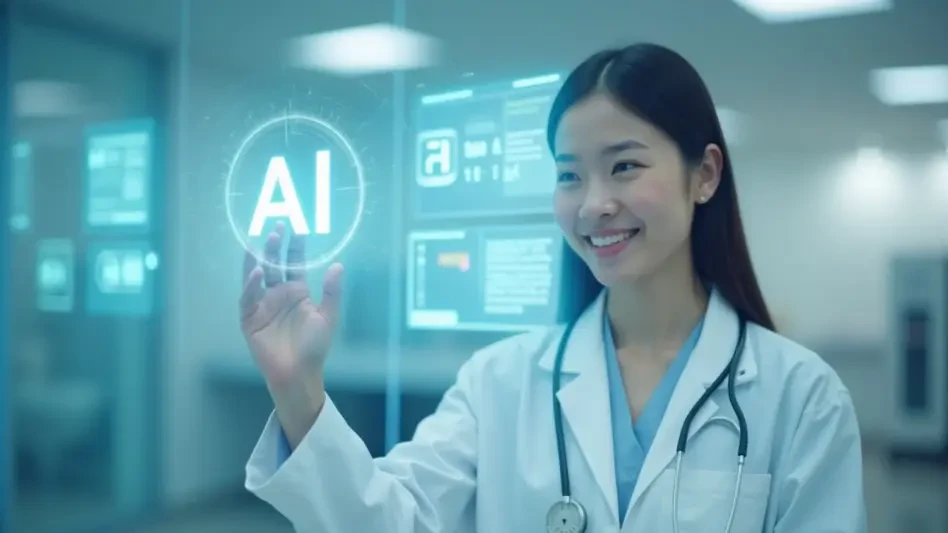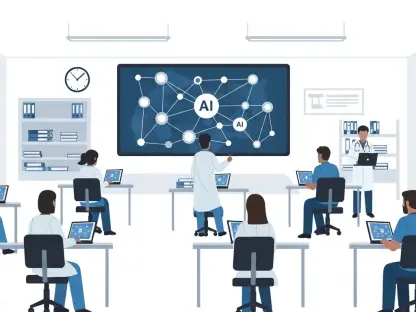Recent developments highlight Jamaica’s proactive stance on integrating artificial intelligence (AI) into its healthcare framework to bolster its services amid ongoing workforce shortages. This approach has gained attention under the leadership of Dr. Christopher Tufton, Minister of Health and Wellness. While the potential for AI to streamline operations and enhance care quality is immense, it faces resistance from existing healthcare personnel wary of adopting new technologies. Dr. Tufton champions the importance of well-executed change management strategies to secure AI’s successful adoption. His stance reflects a broader recognition that simply investing in technology without preparing the workforce for its integration could render such efforts ineffective.
Overcoming Resistance to AI in Healthcare
Change Management as a Necessity
The adoption of AI in healthcare is poised to transform patient care and streamline administrative processes. However, the reluctance among healthcare professionals to embrace these tools remains a significant barrier. Dr. Tufton has been vocal about the need for change management plans to counteract this resistance, emphasizing that stakeholders must understand and buy into these technological shifts. This involves comprehensive training and consistent communication, ensuring that healthcare workers are not only prepared for the transition but also see the value it brings to their roles and patient outcomes. Without these measures, the introduction of AI technologies risks being underutilized, failing to deliver the anticipated benefits.
Dr. Tufton’s recent visits to countries like India and the Philippines underscore a commitment to international collaboration as a strategy to bridge training gaps. By exploring faculty exchanges and joint initiatives, Jamaica seeks to equip its healthcare professionals with advanced skills necessary for both current and future demands. These efforts aim to complement AI integration by enhancing human capital readiness, ensuring that healthcare workers remain an integral part of a technologically advanced system. Particularly with the proposed construction of new hospitals, the combination of an adequately trained workforce and AI tools promises to vastly improve healthcare delivery.
The Role of Intelligent Simulators
Intelligent simulators represent a crucial component in preparing healthcare professionals for the future. Widely used in several countries, these tools offer immersive training experiences that replicate real-world clinical scenarios. By incorporating them into Jamaica’s medical training regimes, the country could effectively expand its capacity to train more healthcare workers despite space limitations. Such simulators allow practitioners to hone their skills and decision-making processes within a controlled environment, enhancing competence without placing unnecessary strain on actual facilities.
Another advantage of intelligent simulators is their ability to offer continuous learning opportunities. Healthcare is an ever-evolving field, and remaining abreast of the latest procedures and technologies is key to maintaining high standards of care. Simulators provide a dynamic platform for ongoing education, enabling professionals to update their knowledge and skills continually. This approach not only supports Jamaica’s immediate goals of overcoming workforce shortages but also lays a foundation for sustainable growth and excellence in healthcare. By leveraging these technologies, Jamaica is setting a precedent for how new tools can be utilized to empower healthcare workers and ultimately benefit patient care.
International Collaboration and Training Initiatives
Expanding Training Opportunities
Jamaica’s efforts to alleviate healthcare workforce challenges through international collaboration signify a strategic move to enhance both capacity and expertise. By fostering faculty exchanges and collaborative training programs, the nation is positioning itself to benefit from the global pool of knowledge and experience. These initiatives provide Jamaican healthcare workers opportunities to learn from established systems and practices abroad, equipping them with innovative skills and perspectives that can be applied locally.
Such collaborative efforts also translate to better resource allocation. As Jamaica plans the construction of additional hospitals, not only does the expansion address infrastructure needs, but it also emphasizes the importance of a well-trained and adaptable healthcare workforce. By adopting a dual approach that balances infrastructural investment with human capital development, Jamaica is well-positioned to improve its healthcare outcomes. This focus on comprehensive capacity-building ensures that the nation remains competitive in an ever-evolving global healthcare landscape.
The Complementary Role of AI
While human capital development remains a priority, AI’s role within this framework cannot be underestimated. AI offers a complementary solution to many of the challenges faced by Jamaica’s healthcare sector, including workforce shortages and the efficiency of care delivery. By automating routine tasks, AI not only frees healthcare professionals to focus on more complex care aspects but also enhances precision in diagnosis and treatment planning. This technology proves invaluable, especially when scaling healthcare services to meet rising demands, particularly within new healthcare facilities.
AI’s potential to integrate seamlessly with human efforts paves the way for a more harmonious, efficient healthcare system. When combined with expanding training initiatives and international collaborations, AI can drive Jamaica toward a future where healthcare services are both advanced and accessible. As such, these multifaceted strategies underscore the importance of viewing AI as an ally, offering capabilities that enhance human skills while ensuring optimized care delivery throughout the system.
A New Era for Jamaican Healthcare
Jamaica has recently taken significant steps to integrate artificial intelligence (AI) into its healthcare system, addressing ongoing workforce shortages and aiming to enhance service delivery. The initiative, guided by Dr. Christopher Tufton, Minister of Health and Wellness, underscores AI’s potential to improve operational efficiency and the quality of care. However, the integration has encountered resistance from healthcare workers who are hesitant to adopt new technologies. Dr. Tufton emphasizes the critical need for effective change management strategies to facilitate AI’s successful implementation. He stresses that simply investing in technology without adequately preparing the workforce for its integration might lead to failures in achieving the desired outcomes. This viewpoint highlights a broader understanding that technological advancement requires a holistic approach, including workforce readiness, to truly benefit the healthcare sector, ensuring that the transformation generates meaningful results and addresses current challenges effectively.









